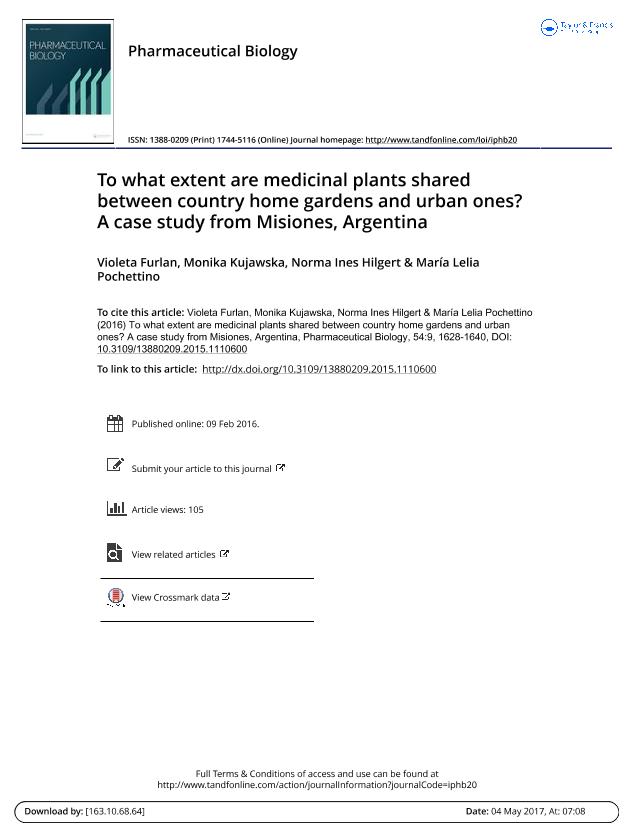Artículo
To what extent are medicinal plants shared between country home gardens and urban ones? A case study from Misiones, Argentina
Fecha de publicación:
09/2016
Editorial:
Taylor & Francis
Revista:
Pharmaceutical Biology
ISSN:
1388-0209
Idioma:
Inglés
Tipo de recurso:
Artículo publicado
Clasificación temática:
Resumen
Context Worldwide ethnobotanical research has shown the importance of home gardens as sources of medicinal plants. These resources are worthy of further study in the Argentinean Atlantic Forest due to the richness of medicinal flora and their importance for local people.
Objective We studied richness, composition, cultural importance and medicinal uses of plants in home gardens of rural, semirural and urban areas in the Iguazú Department (Misiones, Argentina). Our hypothesis claims that people living in different environments have a similar array of medicinal plants in their gardens and they use them in a similar way.
Materials and methods The analysis was based on 76 interviews and plant inventories of home gardens. During guided walks in gardens, voucher specimens were collected. To analyse composition, Simpson similarity index was applied and a new index was proposed to measure culturally salient species.
Results All the environments had similar species composition with species differing in less than 30% of them. The most culturally salient taxa were Mentha spicata L. (Lamiaceae), in rural, Artemisia absinthium L. (Asteraceae), in semirural, and Aloe maculata All. (Xanthorrhoeaceae), in urban areas. The body systems treated with medicinal plants were similar across study sites.
Discussion The results suggest a “core repertoire” of medicinal plants and a widespread exchange of plants among local population. The cultural importance index informs us about plant adaptability, based on the efficacy and the versatility of medicinal resources.
Conclusion In this changing context where mobility and migrations constitute everyday life, medicinal plants in home gardens are part of local healthcare sovereignty.
Palabras clave:
Ailments
,
Anthropogenic Areas
,
Atlantic Forest
,
Cultural Importance Index
Archivos asociados
Licencia
Identificadores
Colecciones
Articulos(CCT - LA PLATA)
Articulos de CTRO.CIENTIFICO TECNOL.CONICET - LA PLATA
Articulos de CTRO.CIENTIFICO TECNOL.CONICET - LA PLATA
Articulos(IBS)
Articulos de INSTITUTO DE BIOLOGIA SUBTROPICAL
Articulos de INSTITUTO DE BIOLOGIA SUBTROPICAL
Citación
Furlan, Violeta; Kujawska, Monika; Hilgert, Norma Ines; Pochettino, María Lelia; To what extent are medicinal plants shared between country home gardens and urban ones? A case study from Misiones, Argentina; Taylor & Francis; Pharmaceutical Biology; 54; 9; 9-2016; 1628-1640
Compartir
Altmétricas




